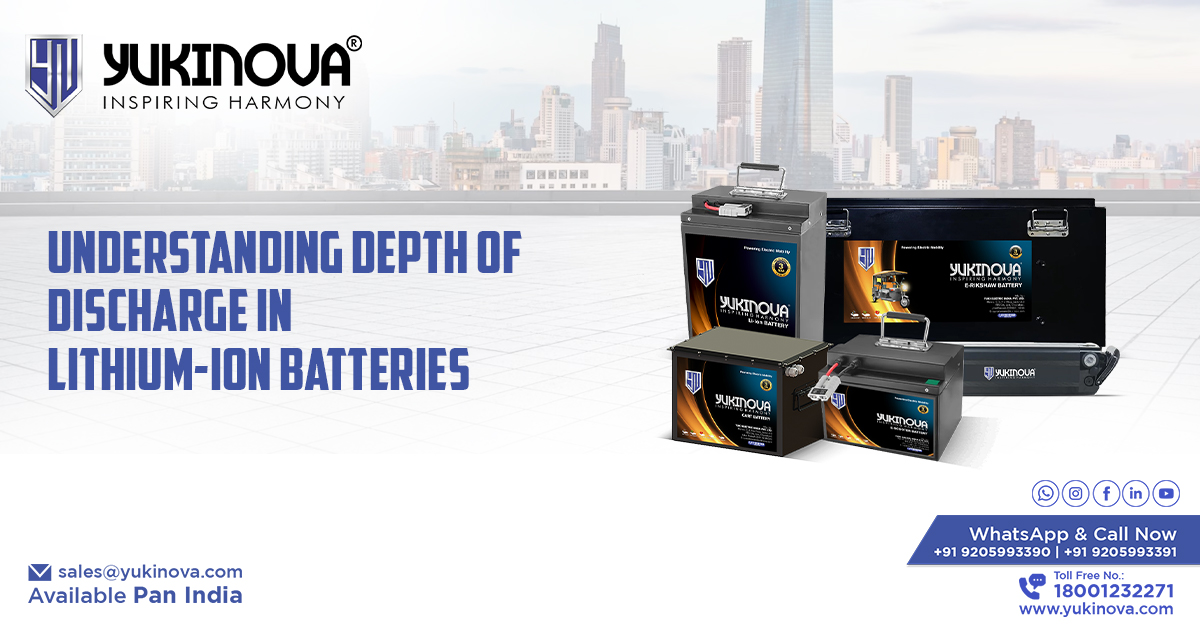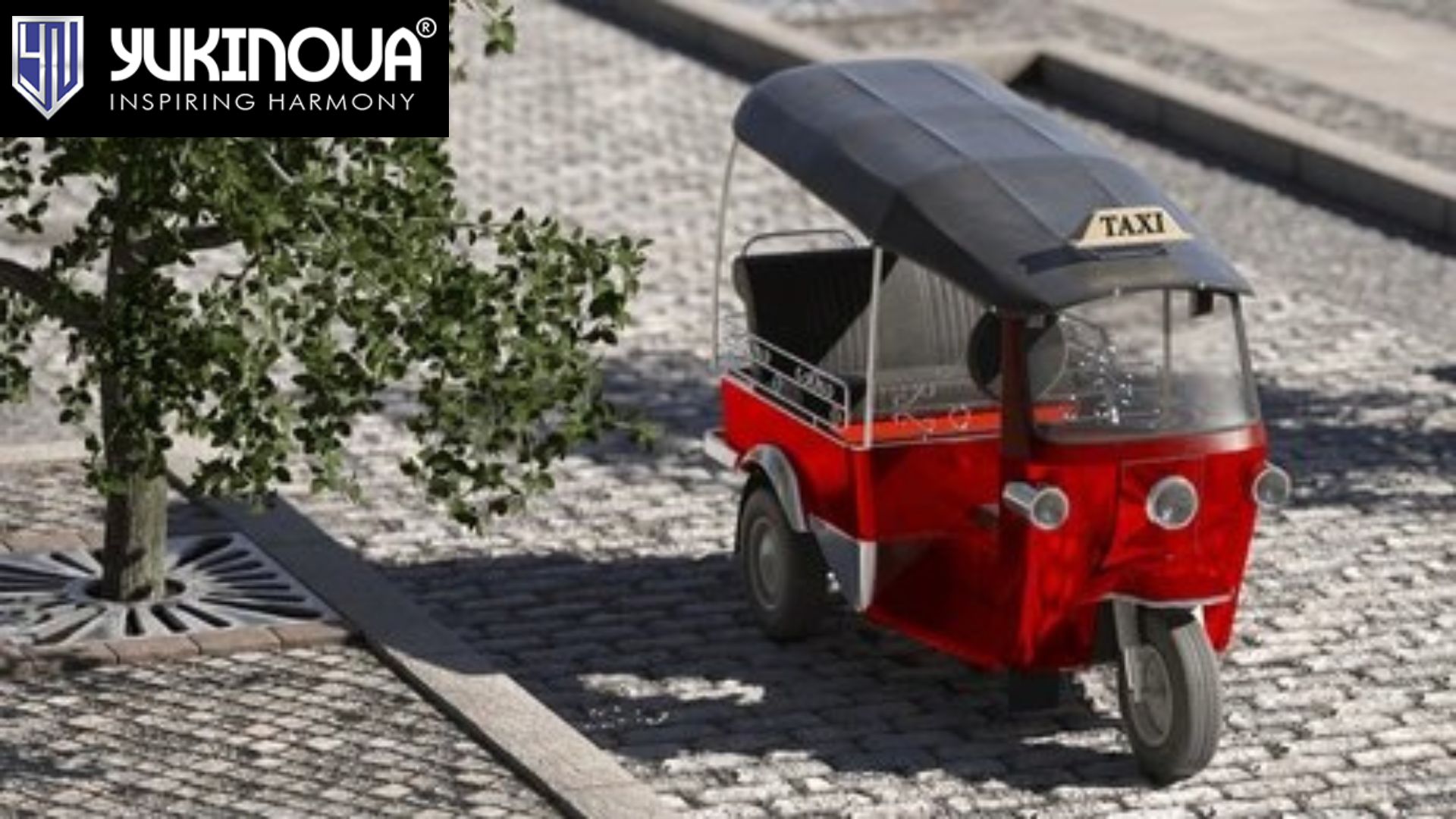In the world of energy storage, lithium-ion batteries are a popular choice due to their efficiency, reliability, and relatively long lifespan. However, one key aspect that affects their performance and longevity is the Depth of Discharge (DoD). As a Lithium-ion Battery Manufacturer in U.P., Yukinova understands the significance of this factor and strives to design batteries that offer optimal DoD, ensuring both performance and durability.
What is Depth of Discharge?
Depth of Discharge (DoD) refers to the percentage of a battery’s total capacity that has been used during its discharge cycle. For instance, if a lithium-ion battery has a total capacity of 100Ah and 40Ah has been consumed, the DoD would be 40%. The more deeply a battery is discharged, the higher the DoD, which impacts the battery’s overall health and lifespan.
A key point to remember is that the more frequently a battery is discharged to a deeper level, the shorter its lifespan will be. Conversely, moderate discharges can help prolong the life of a battery. A good understanding of DoD can help users maximize battery efficiency and make informed decisions about energy storage, particularly in systems like solar energy storage or electric vehicles.
The Role of Depth of Discharge in Battery Performance
The performance of lithium-ion batteries is significantly influenced by DoD. Batteries with a high DoD, i.e., those that are frequently discharged to near-zero levels, tend to experience quicker degradation, resulting in a decrease in their overall capacity. On the other hand, batteries that are kept at a moderate DoD generally last longer, maintaining their capacity for a longer period of time.
As a Lithium-ion Battery Manufacturer in U.P., Yukinova recognizes the importance of maintaining a balanced DoD to ensure that their batteries offer peak performance and longevity. To accomplish this, the company designs batteries with a built-in system that helps manage DoD, preventing deep discharges and optimizing performance.
The Importance of Managing Depth of Discharge
There are several reasons why managing DoD is essential for the efficiency and lifespan of lithium-ion batteries:
1. Prolonged Lifespan: Frequent deep discharges (100% DoD) can cause a significant decline in the battery’s lifespan. By limiting DoD to 70-80%, the battery is less likely to experience wear and tear, ensuring it performs optimally for longer.
2. Energy Efficiency: A lower DoD means less energy is used from the battery before it is recharged. This reduces the overall power consumption and improves energy efficiency, which is particularly important for large-scale systems like electric vehicles or solar energy storage. Yukinova’s batteries are designed with an optimal DoD to help users save energy and reduce costs over time.
3. Battery Health and Safety: Over-discharging a lithium-ion battery can lead to issues like battery degradation, capacity loss, and even safety risks. By keeping the DoD within a safe range, the battery’s health is maintained, and risks are minimized. As a responsible Lithium-ion Battery Manufacturer in U.P., Yukinova incorporates advanced safety mechanisms to prevent deep discharges that could compromise the battery’s integrity.
How Yukinova Optimizes Depth of Discharge
Yukinova, as a Lithium-ion Battery Manufacturer in U.P., takes proactive steps to ensure that its batteries are engineered with optimal DoD management. Through advanced battery management systems (BMS), Yukinova’s lithium-ion batteries are able to monitor and control DoD during every charge and discharge cycle.
This means that Yukinova’s batteries will not allow deep discharges that could harm the battery, extending its useful life while maintaining efficiency. This level of control helps avoid over-stressing the battery, which is often a concern with more traditional energy storage solutions. Additionally, the BMS continuously tracks performance, providing real-time feedback that helps users understand how best to use their battery systems.
For example, in the case of electric vehicles (EVs), Yukinova’s batteries are designed to optimize DoD, providing enough power for daily commutes while preventing excessive strain on the battery. The same approach is applied to energy storage solutions for solar systems, where the battery is designed to perform efficiently while maintaining a balanced DoD for long-term use.
Best Practices for Managing Depth of Discharge
While Yukinova’s batteries are designed with an efficient DoD management system, users can also take steps to ensure that they are using their batteries in a way that maximizes performance and longevity:
1. Avoid Frequent Deep Discharges: Try to avoid discharging the battery completely. Keep the DoD below 80% for optimal results. Most battery systems, including those from Yukinova, function best when not discharged fully on a regular basis.
2. Regular Charging: Top off your battery regularly, even before it reaches a low charge level. This helps prevent deep discharges and ensures the battery operates within a safe and efficient range.
3. Monitor Battery Health: Many devices, especially electric vehicles, come with built-in monitoring systems to track battery health. These systems often provide DoD data, which can help users manage battery usage better.
4. Follow Manufacturer Guidelines: Always follow the manufacturer’s recommendations for DoD limits. As a trusted Lithium-ion Battery Manufacturer in U.P., Yukinova offers clear guidelines on maintaining optimal battery health and performance.
5. Avoid Overloading: Ensure that the battery is not constantly drained too quickly by large loads, which can lead to deeper discharges and faster degradation. Yukinova’s batteries are built to handle moderate to heavy loads, but careful management will always help.
Understanding and managing the Depth of Discharge in lithium-ion batteries is essential to maintaining their performance and extending their lifespan. Yukinova, a leading Lithium-ion Battery Manufacturer in U.P., has engineered its batteries with optimal DoD management systems that ensure users get the most out of their energy storage solutions. With a focus on safety, longevity, and efficiency, Yukinova is dedicated to helping users make the most of their lithium-ion batteries, ensuring peak performance for years to come.

